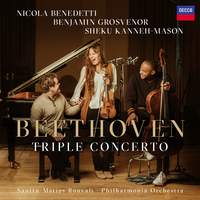Recording of the Week,
Beethoven's Triple Concerto from Benjamin Grosvenor, Nicola Benedetti and Sheku Kanneh-Mason
In his 2005 biography of Beethoven, Lewis Lockwood describes the work as 'a comfortable, rambling composition that aims to please… a work of easy surface qualities but no depth.' It was composed in 1803, and would certainly sit more naturally aside the first two piano concertos (completed in 1795 and 1800 respectively) than it does between the third and fourth, the latter of which was written only two years later, in 1805/6.
The forces assembled here don’t aim to pump the music full of steroids; rather they make the most of its qualities, especially the graceful elegance inspired by Beethoven’s interest in French music of the time. The Philharmonia, under principal conductor Santtu-Matias Rouvali, is as good as ever, as I experienced at a recent concert, and from the very beginning they establish an approach which combines modern instruments with the clarity and articulation normally witnessed from period instrument performances. The orchestral players have fully entered the spirit of this less forceful side of Beethoven without losing energy where it is needed, and the concertante trio joins them in this. There is no sense here of big stars using the music as a vehicle for promotion; they instead put their considerable technical and interpretative skills completely at the service of the music.
This is Beethoven playing that combines measured weight with a charming lightness, allowing all parts of the texture and Beethoven’s orchestration to speak. The consistent approach to phrasing and articulation across the trio and orchestra results in a natural sense of coherence, giving space for the interplay between parts to benefit from the timbral qualities of each instrument.
The individual musicianship and commitment of each player is a constant presence, and this also binds them together as a tight unit. The cellist has the leading part for much of the concerto, and Kanneh-Mason makes the most of this whilst never upsetting the overall balance. His phrasing is beautifully judged, nicely mirrored by Benedetti in the more decorative violin part, and by Grosvenor in a piano part which is focused mostly on accompanying figurations and melodic interjections. Never does Grosvenor impose the scale of the concert grand on the music, and his musicianship is supported by an excellent piano (a Steinway D from the Queen Elizabeth Hall). The piano technician, Peter Salisbury, tells me that Grosvenor has used the same piano on many of his recordings, and that it has two actions which are interchangeable to match his and Grosvenor’s 'attitude of wanting the best musical outcome'.
Whilst I agree with Lockwood that this is not the most original of Beethoven’s compositions, the present recording makes a good case without distorting it to be more than it is. The 2021 recording by Isabelle Faust, Jean-Guihen Queyras and Alexander Melnikov is highly recommended as a period instrument option, and there are a number of alternative modern instrument options, including an excellent LSO Live recording featuring the late Lars Vogt, Tim Hugh, Gordan Nikolitch and Bernard Haitink.
The works that form the second half of the programme have been well chosen and nicely complement the concerto. Gerald Finley proves an excellent choice for the Welsh, Scottish, English and Irish folksongs, bringing to life a part of Beethoven’s output with which many listeners won’t be familiar. A couple of these folksongs are also featured on Ian Bostridge’s Beethoven Lieder and Folksongs album with Antonio Pappano, and it is interesting to hear the darker quality of Finley’s baritone in comparison to the latter’s expressive lyric tenor.
The most familiar melody in the programme is the closing track, ‘Londonderry Air’ (more commonly known as ‘Danny Boy’), played by the trio alone. Fritz Kreisler’s arrangement makes for an attractive encore piece, and it is played well.
Decca’s sound is superb throughout, completing a release which comfortably adds up to the sum of its parts, with the folksongs proving a nice bonus.
Nicola Benedetti (violin), Sheku Kanneh-Mason (cello), Benjamin Grosvenor (piano), Gerald Finley (baritone), Philharmonia Orchestra, Santtu-Matias Rouvali
Available Formats: CD, MP3, FLAC, Hi-Res FLAC




